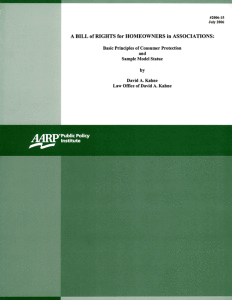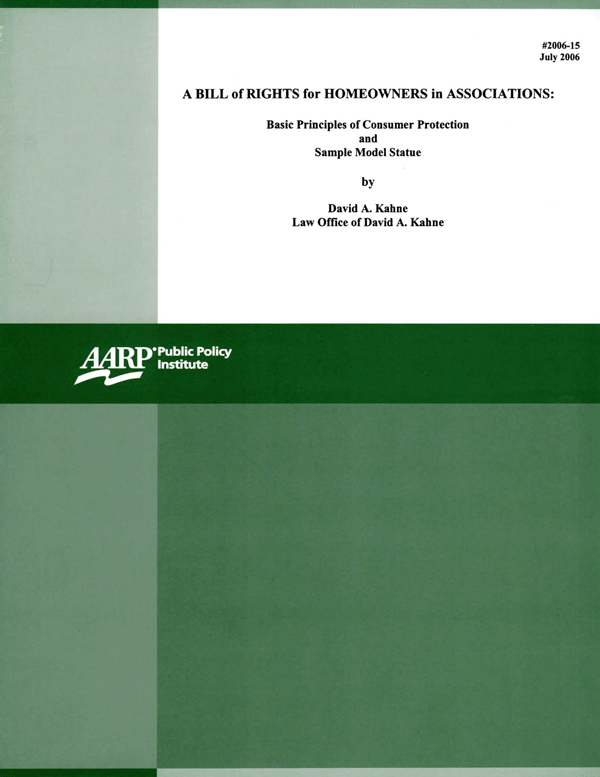 My monograph, “A Bill of Rights for Homeowners in Associations.” was published in 2006. After reviewing problems that had been observed across America, I distilled 10 points that ought to be enacted in laws to protect homeowners. These points, as distilled in the monograph, are listed below.
My monograph, “A Bill of Rights for Homeowners in Associations.” was published in 2006. After reviewing problems that had been observed across America, I distilled 10 points that ought to be enacted in laws to protect homeowners. These points, as distilled in the monograph, are listed below.
No state has adopted all these points, but some statutes now provide some of the protections. (Note, the monograph cites some laws that have, since publication, been changed.)
We don’t need to wait for states to act. Each subdivision or condominium could adopt its own Bill of Rights, using these principles. That requires homeowners to organize. When the Supreme Court praises “liberty in the home” – we can do it!
BILL OF RIGHTS FOR HOMEOWNERS
To ensure amicable and equitable relations between homeowners and their associations, this bill of rights seeks fair resolution of disputes, specifies rights regarding rules and charges, ensures individual autonomy, and promotes oversight and voting. The bill of rights uses reasonability as the touchstone for all actions, and includes a state Office of Ombudsperson for Homeowners to facilitate resolution of disputes in a manner that strengthens communities.
I: The Right to Security against Foreclosure
An association shall not foreclose against a homeowner except for significant unpaid assessments, and any such foreclosure shall require judicial review to ensure fairness.
II: The Right to Resolve Disputes without Litigation
Homeowners and associations will have available alternative dispute resolution (ADR), although both parties preserve the right to litigate.
III: The Right to Fairness in Litigation
Where there is litigation between an association and a homeowner, and the homeowner prevails, the association shall pay attorney fees to a reasonable level.
IV: The Right to Be Told of All Rules and Charges
Homeowners shall be told–before buying–of the association’s broad powers, and the association may not exercise any power not clearly disclosed to the homeowner if the power unreasonably interferes with homeownership.
V: The Right to Stability in Rules and Charges
Homeowners shall have rights to vote to create, amend, or terminate deed restrictions and other important documents. Where an association’s directors have power to change operating rules, the homeowners shall have notice and an opportunity, by majority vote, to override new rules and charges.
VI: The Right to Individual Autonomy
Homeowners shall not surrender any essential rights of individual autonomy because they live in a common-interest community. Homeowners shall have the right to peaceful advocacy during elections and other votes as well as use of common areas.
VII: The Right to Oversight of Associations and Directors
Homeowners shall have reasonable access to records and meetings, as well as specified abilities to call special meetings, to obtain oversight of elections and other votes, and to recall directors.
VIII: The Right to Vote and Run for Office
Homeowners shall have well-defined voting rights, including secret ballots, and no director shall have a conflict of interest.
IX: The Right to Reasonable Associations and Directors
Associations, their directors and other agents, shall act reasonably in exercising their power over homeowners.
X: The Right to an Ombudsperson for Homeowners
Homeowners shall have fair interpretation of their rights through the state Office of Ombudsperson for Homeowners. The ombudsperson will enable state oversight where needed, and increases available information for all concerned.
Click here for the full document prepared for the AARP Public Policy Institute.

